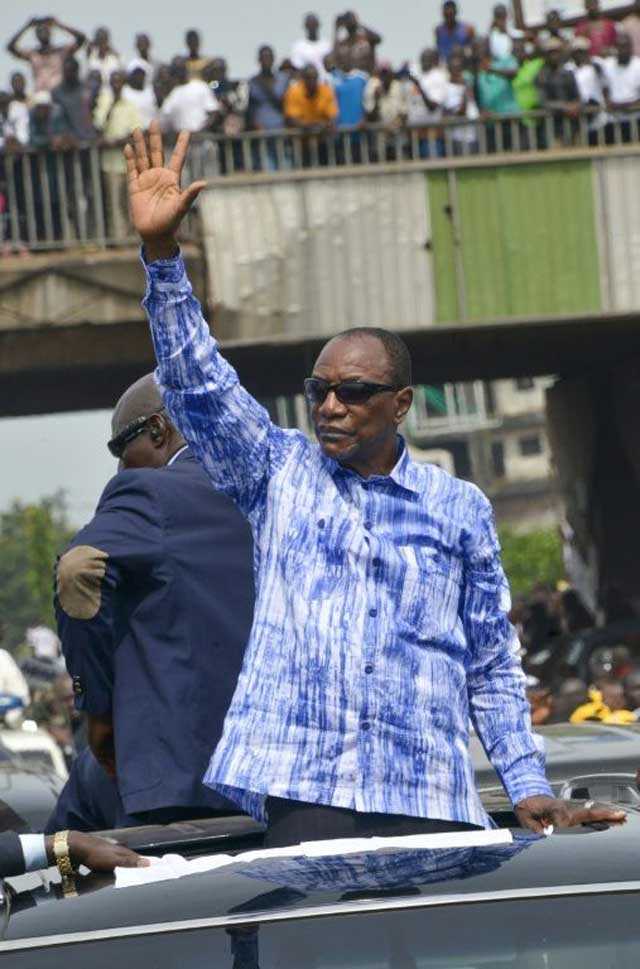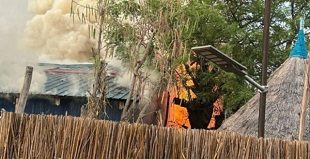
Conakry, Guinea | AFP | Guineans will be called to vote Sunday on whether to adopt a new constitution, after months of protests sparked by charges that it is a trick by President Alpha Conde to stay in power.
The government says the draft constitution will, among other things, codify gender equality and ban female circumcision and under-age marriage in the West African state.
But critics fear the real motive is to reset presidential term limits, allowing Conde, 81, to run for a third spell in office later this year.
The vote is taking place against a background of tension and violence.
Guineans have protested en masse since mid-October, in rallies that have led to the deaths of 30 demonstrators and one gendarme, according to an AFP tally.
There are growing concerns about the fairness of Sunday’s constitutional referendum — which is taking place alongside a parliamentary poll — and the potential for bloodshed in a country whose politics are drawn mainly along ethnic lines.
“He’ll invariably get the result he wants,” former premier and opposition leader Cellou Dalein Diallo said of the president, implying malfeasance.
Major opposition parties are boycotting Sunday’s twin polls and have previously vowed to try to stop them from occurring.
There was almost no sign of campaigning in the coastal capital of Conakry this week.
Billboards bearing slogans such as “Yes for equality” or “Yes for investment in the youth” loomed over roads clogged with honking cars, but public rallies were hardly to be seen.
“You won’t see any electoral campaign,” said a chuckling Sekou Conde, a cadre from Conde’s Rally of the Guinean People (RPG) party, adding that government ministers were campaigning in the interior.
The former French colony’s constitution limits presidential terms to two, but Sekou Conde admitted a new constitution would reset the counter to zero.
He added that most Guineans wanted the president to stay in power to ensure economic growth.
“What’s wrong with that?” he asked, explaining that referendums are democratic.
President Conde became Guinea’s first democratically-elected leader in 2010 and was re-elected in 2015.
Activists have accused him of authoritarian drift, however, after arrests of opposition figures and protest deaths.
Deep mutual suspicion runs between his government and the main opposition party, the Union of Democratic Forces of Guinea (UFDG), as well as civil-society protest organisers.
Diallo, who travels with a dozen burly UFDG activists for security, told AFP most Guineans opposed the vote and predicted high abstention.
But voters interviewed by AFP appeared polarised, with some vowing to boycott and others urging opposing parties to engage.
Law student Abdouramane Keita said he wanted talks between the opposing parties.
“I want to vote in calm,” he said.
All army units have been placed on a state of alert ahead of the elections, army headquarters said.
-‘People are afraid’-
President Conde himself has remained elusive. He has told French media it is up to his party to decide whether he runs again.
In Conakry, AFP and local journalists were barred from a Conde event at RPG headquarters by young party activists.
Kabinet Fofana, the president of Guinea’s association of political scientists, said there was little enthusiasm for the poll in the capital, where the opposition dominates.
“The other thing is that people are afraid,” he said. “There is a psychosis where people are afraid to take part in meetings”.
Guinea is an impoverished but mineral-rich nation of some 13 million people who hail from several ethnic groups, and the tensions have stoked concern of violence.
Conde’s party is largely backed by Malinke people and Diallo’s by Fulani, also called Peul, although both point to diverse support across the country.
-‘Almost a farce’ –
Few opposition supporters expect Sunday’s poll will be fair.
This week, the International Organisation of La Francophonie (OIF), gathering French-speaking states, said it had problems with 2.49 million out of the 7.7 million names on the electoral roll. They included duplicate registrations and people who had died.
The head of the electoral commission, Amadou Salif Kebe, said the register was not flawless but “sufficiently credible”.
But a Western diplomat, who requested anonymity, was scathing.
“The electoral process is almost a farce,” he said, warning that the risks of ethnic violence were real.
Nonetheless, the diplomat said most people were not interested in the poll and “a major uprising” was unlikely.
“The real game is the presidential election,” the diplomat said, referring to the poll expected later this year.
 The Independent Uganda: You get the Truth we Pay the Price
The Independent Uganda: You get the Truth we Pay the Price



